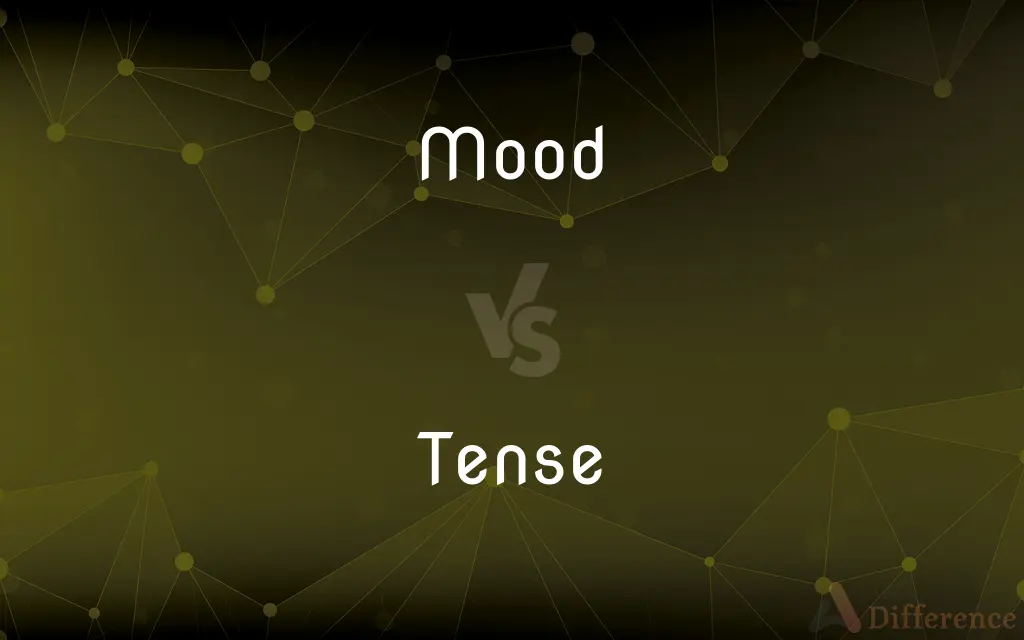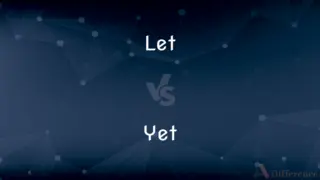Mood vs. Tense — What's the Difference?

Difference Between Mood and Tense
ADVERTISEMENT
Compare with Definitions
Mood
A particular state of mind or emotion
News that put us in a good mood.
Tense
Tightly stretched; taut.
Mood
A pervading impression of an observer
The somber mood of the painting.
Tense
In a state of nervous tension or mental strain
Was very tense before the exam.
Mood
An instance or spell of sulking or angry behavior
A friend's visit lifted him out of his mood.
ADVERTISEMENT
Tense
Causing or characterized by nervous tension or mental strain
A tense standoff between border patrols.
Mood
Inclination; disposition
I'm in the mood for ice cream.
Tense
(Linguistics) Enunciated with taut muscles, as the sound (ē) in keen.
Mood
A property of verbs in which the speaker's attitude toward the factuality or likelihood of the action or condition expressed.
Tense
To make or become tense.
Mood
A category or set of verb forms or inflections used to indicate such an attitude. In English, the indicative mood is used to make factual statements, the subjunctive mood to indicate doubt or unlikelihood, and the imperative mood to express a command.
Tense
A property of verbs in which the time of the action or state, as well as its continuance or completion, is indicated or expressed.
Mood
(Logic) The arrangement of statement types in a syllogism.
Tense
A category or set of verb forms that indicate or express the time, such as past, present, or future, of the action or state.
Mood
A mental or emotional state, composure.
I've been in a bad mood since I was dumped by my ex-boyfriend.
Tense
Any of the forms of a verb which distinguish when an action or state of being occurs or exists.
The basic tenses in English are present, past, and future.
Mood
Emotional character (of a work of music, literature, or other art).
Tense
An inflected form of a verb that indicates tense.
English only has a present tense and a past tense; it has no future tense.
Mood
A sullen, gloomy or angry mental state; a bad mood.
He's in a mood with me today.
Tense
The property of indicating the point in time at which an action or state of being occurs or exists.
Dyirbal verbs are not inflected for tense.
Mood
A disposition to do something, a state of mind receptive or disposed to do something.
I'm not in the mood for running today.
Tense
To apply a tense to.
Tensing a verb
Mood
A prevalent atmosphere, attitude, or feeling.
A good politician senses the mood of the crowd.
Tense
(transitive) To make tense.
Mood
(slang) A familiar, relatable feeling, experience, or thing.
Tense
(intransitive) To become tense.
Mood
(grammar) A verb form that depends on how its containing clause relates to the speaker’s or writer’s wish, intent, or assertion about reality.
The mood most frequently encountered in English is the indicative, of which the mood in this sentence is an example.
Tense
Showing signs of stress or strain; not relaxed.
You need to relax, all this overtime and stress is making you tense.
Mood
(slang) Used to express that the speaker finds something very relatable.
—I am feeling very exhausted today. —Mood.
Tense
Pulled taut, without any slack.
Mood
Manner; style; mode; logical form; musical style; manner of action or being. See Mode which is the preferable form).
Tense
One of the forms which a verb takes by inflection or by adding auxiliary words, so as to indicate the time of the action or event signified; the modification which verbs undergo for the indication of time.
Mood
Manner of conceiving and expressing action or being, as positive, possible, conditional, hypothetical, obligatory, imperitive, etc., without regard to other accidents, such as time, person, number, etc.; as, the indicative mood; the imperitive mood; the infinitive mood; the subjunctive mood. Same as Mode.
Tense
Stretched tightly; strained to stiffness; rigid; not lax; as, a tense fiber.
The temples were sunk, her forehead was tense, and a fatal paleness was upon her.
Mood
Temper of mind; temporary state of the mind in regard to passion or feeling; humor; as, a melancholy mood; a suppliant mood.
Till at the last aslaked was his mood.
Fortune is merry,And in this mood will give us anything.
The desperate recklessness of her mood.
Tense
A grammatical category of verbs used to express distinctions of time
Mood
A characteristic (habitual or relatively temporary) state of feeling;
Whether he praised or cursed me depended on his temper at the time
He was in a bad humor
Tense
Stretch or force to the limit;
Strain the rope
Mood
The prevailing psychological state;
The climate of opinion
The national mood had changed radically since the last election
Tense
Increase the tension on;
Tense a rope
Mood
Verb inflections that express how the action or state is conceived by the speaker
Tense
Become tense or tenser;
He tensed up when he saw his opponent enter the room
Tense
Make tense and uneasy or nervous or anxious;
Tense
In or of a state of physical or nervous tension
Tense
Pronounced with relatively tense tongue muscles (e.g., the vowel sound in `beat')
Tense
Taut or rigid; stretched tight;
Tense piano strings
Share Your Discovery

Previous Comparison
Let vs. Yet
Next Comparison
Distillery vs. Brewery













































